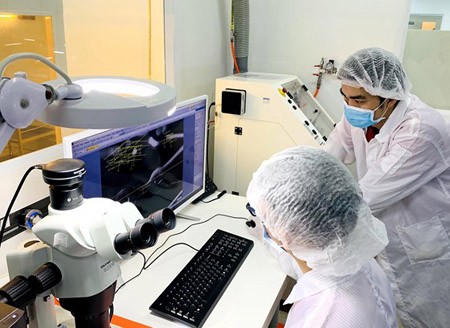
The new Decree is to replace the current outdated Decree No. 80/2007/ND-CP, also for science-technology businesses based on the Science-Technology Laws in 2000, when research and development activities were not highly appreciated.
Statistics of NATEC (the National Agency for Technology Entrepreneurship and Commercialization Development), a member of the Ministry of Science and Technology, show that until the beginning of 2019, there are around 3,000 businesses that meet all requirements to be considered a science-technology firm (STF), yet only over 400 are certified. This means many companies have not been much interested in becoming an STF since related preferences are not attractive while administrative procedures for this process are too complicated.
Basically, the content of the new Decree does not change much compared to Decree No.80; however, it can simplify various concerning administrative works to certify a STF. Certain incentive policies from the government are clearly instructed now, making it much easier to apply into reality.
There are, nevertheless, some trouble which requires adjustment in higher level legal documents (like the Tax Law, the Business Law, the Investment Law, and the National Budget Law). This forces the Ministry of Science and Technology as well as related agencies to continue their hard work in the near future.
As said by a representative of NATEC, formerly, to register for a STF, a company must be in one of the seven regulated categories, have good results from science-technology missions, receive or import new technology from other companies, and explain the process to achieve those science-technology results.
In reality, not many companies are able to sign up for intellectual property rights but receive technology transfer for their own private use. Therefore, these businesses can hardly provide valid evidence on the right to own or use their research results.
What is more, the old regulation asks that any STF wishing to receive tax preferences need to possess a minimum 30 percent revenue rate from science-technology products out of the total income in the first operating year subject to taxation. That rate must increase to at least 50 percent and 70 percent in the second and third years respectively. This is extremely hard to achieve as most STF are still small scale, or their science-technology products are not their staples.
To amend the situation, Decree No.13 will allow businesses of all fields to register for a STF certificate. To prove their science-technology research results, besides certified science-technology products (such as patents, industrial design certificates, proof document of technology transfer), those companies can follow Circular No.02/2015 to request the local departments of science and technology to form an evaluation board for their research results or products which have not used national budget. This evaluation can become valid evidence for the registration process.
Another noticeable point in Decree No.13 is the condition to be entitle to tax incentive. The revenue rate of science-technology products compared to the total income of an STF is now stable at the minimum of 30 percent per year, which is much more feasible. When having this tax incentive, an STF can be exempt from tax in the first 4 years, and only submit 50 percent of the regular tax in the next 9 years.
These attractive tax preferences and practical registration conditions are expected to allow businesses more flexibility in identifying their commercial aims for science-technology products in accordance with their own ability as well as market fluctuations, and to welcome more participation of the private sector in scientific research and development.
According to Deputy Minister of Science and Technology Bui The Duy, Decree No.13 is able to institutionalize the orientation of the National Assembly as well as the government to consider businesses as the center in the national innovative process.
In the meeting to implement new tasks of the science and technology field in 2019, Deputy Prime Minister Vu Duc Dam insisted that although science and technology have become the focus for the national development, many regions in the nation have not truly paid attention to this field.
He hoped that in the near future the local departments of science and technology would be more active in supporting businesses, creating new forces for the social-economic development.
























